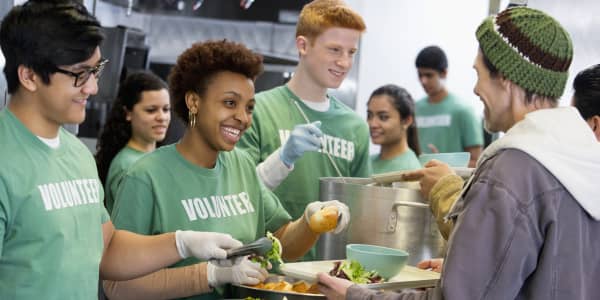Shoppers at the Fresno, California, Wal-Mart this Black Friday could have been forgiven if they had a bit of trepidation while starting their holiday shopping.
Five days before the retail extravaganza, members of the Hells Angels motorcycle club began camping out at the store. The burly tattooed bikers, wearing their cuts, were an intimidating sight, and when sales began, they bought every bicycle in the store—more than 200—and promptly donated them to the Poverello House, a local nonprofit dedicated to helping the homeless and needy.
While the Hells Angels may have a questionable reputation in the world of motorcycle clubs, it also holds an annual toy drive, as do many other clubs around the country.
There's no denying the criminal reputations of some MCs. And shows like AMC's "Sons of Anarchy" have cemented that image in some people's heads. But there are some biker groups dedicated to good causes.
One of the largest of these is BACA, Bikers Against Child Abuse. Founded in 1995 in Utah by John Paul "Chief" Lilly, a social worker and a registered play therapist/supervisor, this 501(c)(3) organization has since gone international (though officials declined to give total membership numbers).
The purpose of the club, said "Ish," secretary of the founding Utah chapter and the group's spokesperson, who did not want to disclose his name, is to empower abused children and give them the courage to face their abusers and get justice.
"Kids are very perceptive," he said. "They can tell real quick if someone has the best of intentions, and usually know faster than adults do."
When teachers, parents, friends or officials make BACA aware of an abuse situation, two members are assigned as primary contacts for the child, and he or she is told they can be reached for help at all times. Beyond that, there are four levels of intervention.
Tough love
We're a strand of barbed wire around the child. We're there to protect them—and if you get too close, you get hurt."Ish"Secretary of Utah chapter, BACA
The first involves gathering as many BACA members as possible and taking a picture of them with the child and giving them a patch. Those act as comfort items for the child to let them know they're not alone. If that's not sufficient, BACA members will make themselves visible at the child's home when he or she might be most vulnerable, in hopes that their presence might deter violence.
Read MoreAverage investor's charity play
Level 3 involves sending a letter to the abuser on BACA letterhead, letting that person know the MC is "prepared to take whatever steps are necessary to become the obstacle to further abuse." If that doesn't work, the club will go door-to-door in the abuser's neighborhood as part of an "awareness ride."
What the club doesn't do is seek out confrontation with the abuser, according to its mission statement, which reads "BACA does not condone, support or participate in the use of aggression, violence or physical force in any manner. If, however, any person should seek to inflict harm on one of our BACA Members, we will respond with commitment and loyalty to protect our Member."
Ish puts it a bit more succinctly.
Which country gives the most to charity?
"We're a strand of barbed wire around the child," he said. "We're there to protect them—and if you get too close, you get hurt."
Zero tolerance
In Pennsylvania, Justice Rescue is a group of bikers that works to prevent animal cruelty, especially to pit bulls. The group does everything from educating unaware owners about the dangers pets face when left outside to breaking up dog-fighting rings. The group works with local law enforcement but will act independently if it discovers abuse on its own.
"Justice Rescue has a zero tolerance for animal cruelty, abuse and neglect," says the group's mission statement. "[We] will investigate reported cases and take the necessary steps to stop the abuse. Our goal is that no animal will be left behind."
Read More10 big crowdfunding campaigns making a difference
The bikers behind these good causes know the reputation that precedes them, and it often works in their favor as they try to prevent things like abuse. However, they insist, while they're not a group you want to tangle with if you're doing something bad, the reality about bikers doesn't necessarily match the myth.
"Intimidation is something that typically is not founded on anything logical," said Ish. "It's an innate fear of the unknown. ... Sometimes kids will be very timid when we first introduce ourselves, but just about every time by the time our initial visit is over with them, they're talking and running around with us and playing games and having fun."




